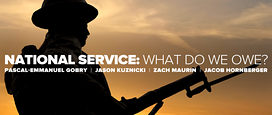Bear with me, my fellow libertarians, for a short few paragraphs. Imagine I decided that universal military conscription was a wonderful idea. (Bear with me, I said…)
Suppose I also decided that universal civilian service was a great idea. (Ahem…)
And, not to sound too smug, but I want to do better. I want to serve not just for a year, but for my entire working life. I know: It’s not a contest. But I really, really care!
Immediately there’s a problem: I don’t know where to start. I love children, old folks, sick folks, and puppies. And I care about disaster relief. I want to end human trafficking and I want to end homelessness. I want everyone to have a decent education. And I want no one to go hungry.
I don’t have time for it all.
I also don’t know what I’m good at. It would be a terrible shame if I spent my whole life selflessly serving food, when it turned out that I should have been selflessly processing signals intelligence for the navy. Or if I’d been a halfway decent advocate for the homeless, when I could have been an outstanding elementary school teacher.
It gets worse. I don’t know what other people are good at, either. That matters a lot more than one might think: It might be that I’m an excellent teacher, but others are better, and the place where I have the largest comparative advantage is in ditch-digging.
If only I had some kind of signal to let me know that this was the case! If only we could all coordinate our needs and talents over space and time! If only we knew what other people’s efforts were worth in different lines of work, in light of the resources, plans, and needs of others!
This of course is exactly what the free market does. As a result, the vast majority of “community service” is performed efficiently, through markets, for pay and even for profit.
That brings me to one thing I find rather grating about discussions of national service — the implication that people who work for profit are not as good as people who don’t: If I work for profit rather than allowing myself to be conscripted, I am, in Gobry’s words, not a patriot. Likewise, in Zach Maurin’s vision, I’m not a complete American.
To both, what for-profit workers do is selfish — and thus morally suspect. But I don’t understand why this should be. Among the many things that for-profit, for-pay work creates is income for the worker. My assessment of these people is that they are independent, and independence is wonderful.
Markets aren’t perfect, of course, and I will never tell you that they are. But the advocates of removing goods and services from the market process and transferring them to the political process first have to make two related arguments:
1. There is a genuine market failure.
and
2. My proposal improves on this less-than-optimal but still-functioning market.
To Gobry’s credit, national defense is a textbook case of market failure. Those who do neither pay taxes nor perform service will nonetheless reap all the benefits of having a national defense force. National defense is a non-excludable service; it makes free riders everywhere.
But our society has already solved this free rider problem, with the heavy hammer of taxation. If I pay taxes, I am not a free rider. Claiming to resurrect the free rider problem will not suffice to make the case for conscription on top of taxation, not as long as other people willingly enlist.
Things are still less developed when it comes to Maurin’s proposal for universal civilian service, because Maurin hasn’t asserted a market failure at all. Identifying a need that has gone unmet isn’t enough: In a world of scarce resources, needs will always go unmet, even if markets are optimally efficient.
Without identifying a market failure, and without articulating how a given program will solve it efficiently, we should not legislate. Untethering a great deal of paid nonprofit labor from the market, subsidizing it at the federal level, and removing the price signals that guide individuals toward better career choices seems like a terrible idea to me — more likely to hurt than to help. If we managed food production that way, we’d go hungry. It’s been tried, and it happens.
Further, I am skeptical of the neatness of the proposal, when our very best stab at efficiency in the real world is so often messy, provisional, and flexible. How on earth does it just so happen that exactly one year of service is the appropriate, market-clearing amount, year after year? How does it just so happen that efficiency coincides with this much labor, at the given wage, whatever that wage may prove to be?
To the ears of this capitalist pig — for so I will surely be called — Maurin’s proposal sounds narrowly selfish: It makes much use of others’ resources. It makes his heart seem to be in the right place (which of course it has been all along). But it’s very doubtful that the proposal creates value on net. Even giving cash to nonprofits would be more efficient than supplying them in-kind with labor. And a better, still less coercive proposal would be to end the minimum wage for the nonprofit sector.
We might then also consider leaving the taxpayers’ money in their pockets. Perish the thought.

